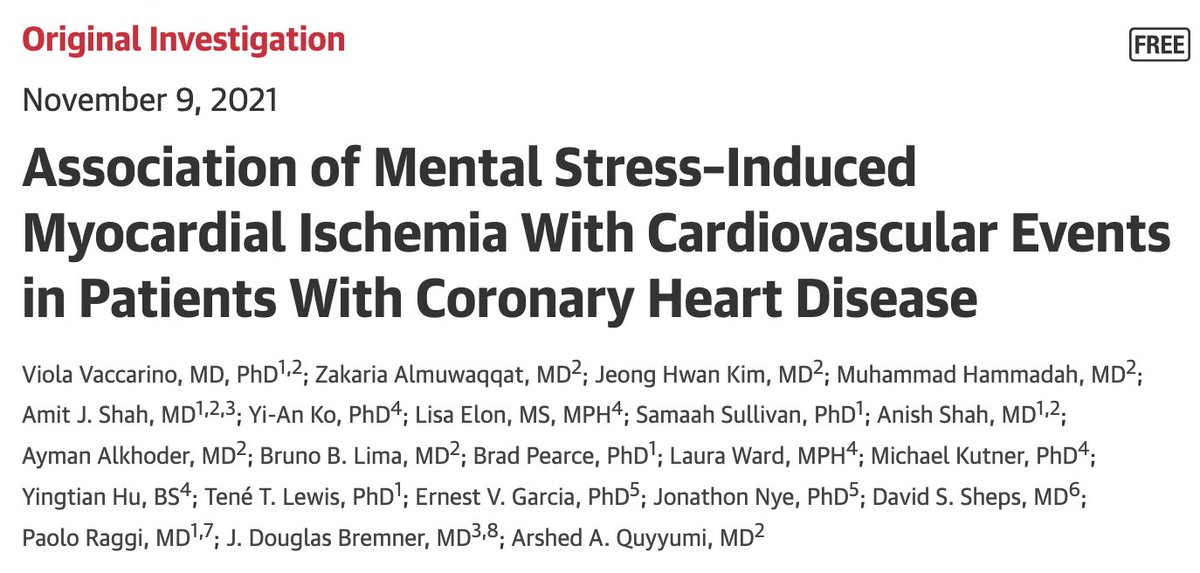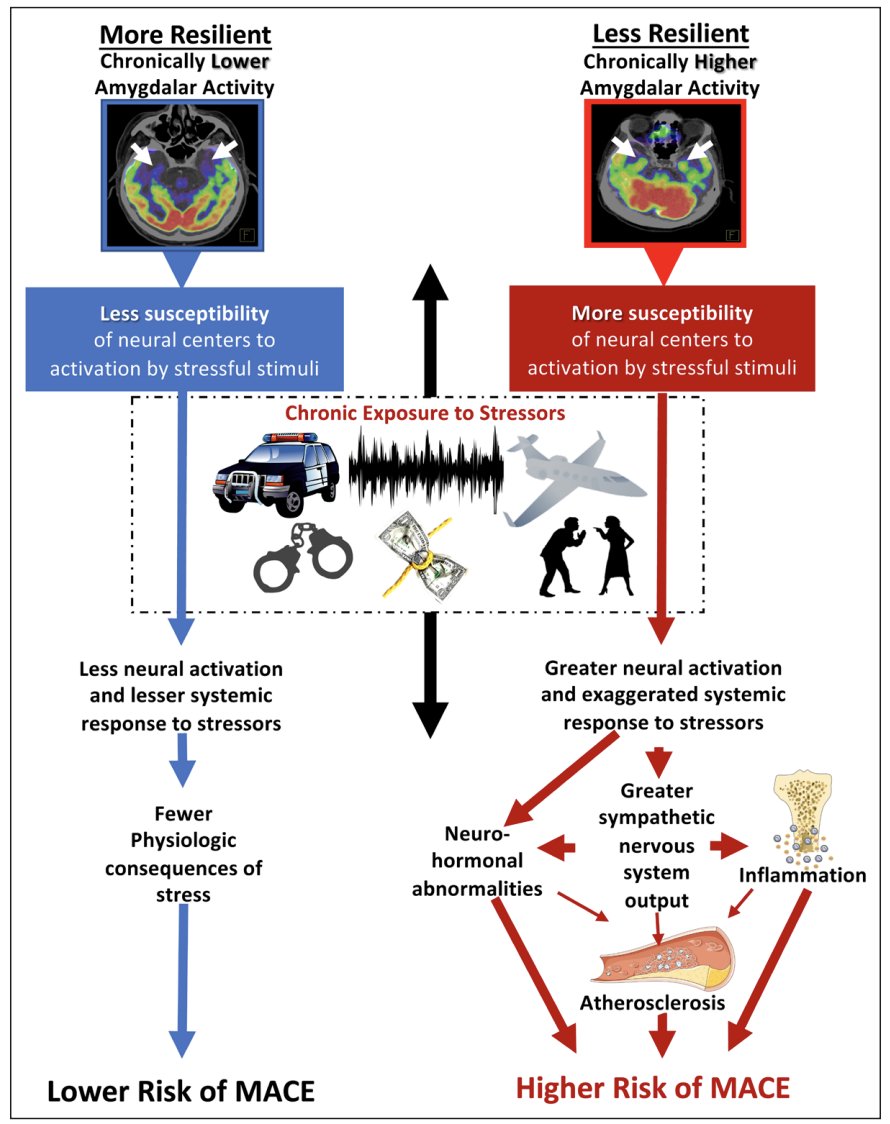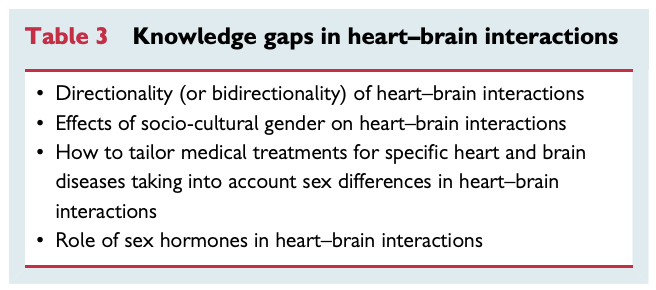
We all know that stress is bad for our hearts.⚠️❤️
But did you know there is actual evidence of this heart-brain connection on FDG PET/CT?
A #Tweetorial 🧵 #CardioTwitter #MedTwitter #MedEd
But did you know there is actual evidence of this heart-brain connection on FDG PET/CT?
A #Tweetorial 🧵 #CardioTwitter #MedTwitter #MedEd

We know that the stress response begins in the 🧠 salience network - the AMYGDALA is a 🔑 component.
Activation of this network ⬆️ SNS output, which ⬆️ immune cell output from the bone marrow.
Amygdalar activity ⬆️ in chronic stress conditions e.g., PTSD, anxiety & depression.
Activation of this network ⬆️ SNS output, which ⬆️ immune cell output from the bone marrow.
Amygdalar activity ⬆️ in chronic stress conditions e.g., PTSD, anxiety & depression.
In other words, chronic psychologic stress causes ⬆ activation of the amygdala which, in turn, activates systemic inflammation.
And we know from several histopathological & clinical studies, as well as clinical trials such as JUPITER and CANTOS, that atherosclerosis is an INFLAMMATORY process.
Macrophages are the predominant inflammatory cell type in atherosclerotic plaques (have ⬆️metabolic activity).
Macrophages are the predominant inflammatory cell type in atherosclerotic plaques (have ⬆️metabolic activity).
Ok, this all makes sense, in theory...but wouldn’t it be great if we could SEE the connection between chronic stress and atherosclerosis?!
Enter FDG PET/CT
Enter FDG PET/CT
Fluorodeoxyglucose (FDG) is a radioactive analogue of glucose (18F labeled), which accumulates in tissues in proportion to its rate of glycolysis
i.e., accumulates in metabolically active tissues e.g., tumors, localized infections & localized inflammation.
i.e., accumulates in metabolically active tissues e.g., tumors, localized infections & localized inflammation.
Therefore, FDG PET/CT has the potential to simultaneously measure stress-related neural activity (i.e., amygdalar activity), haemopoietic tissue activity and large vessel atherosclerotic inflammation.
Indeed, using FDG PET/CT, @ATawakolMD et al. described a serial pathway of: ⬆️ stress to ⬆️ amygdalar activity to ⬆️ hematopoietic tissue activity to ⬆️ arterial inflammation to ⬆️ MACE. pubmed.ncbi.nlm.nih.gov/28088338/ 





Interestingly, Fiechter et al have shown that ⬆️amygdalar activity associated w abnormal myocardial perfusion &⬇️EF in women (not in men), suggesting stress-related neural activity as a possible contributor to the observed sex disparities in CVD outcomes pubmed.ncbi.nlm.nih.gov/31083711/ 



Ok, so we can literally SEE the connection between chronic stress and atherosclerosis using FDG-PET.
But why is studying this heart-brain connection important for all @CardioNerds? 👇👇👇
But why is studying this heart-brain connection important for all @CardioNerds? 👇👇👇
Mental stress–induced myocardial ischemia:
🔴is usually asymptomatic
🔴occurs at a ⬇️ hemodynamic workload
🔴can occur in pts w a -ve stress test
🔴was associated with an ⬆️risk of CV death or nonfatal MI.
jamanetwork.com/journals/jama/…

🔴is usually asymptomatic
🔴occurs at a ⬇️ hemodynamic workload
🔴can occur in pts w a -ve stress test
🔴was associated with an ⬆️risk of CV death or nonfatal MI.
jamanetwork.com/journals/jama/…


Studying the heart-brain connection can also help us understand the biological mechanisms that mediate the relationship between non-traditional risk factors & poor cardiovascular outcomes as well as identify possible targets for intervention. 👇👇👇
@ATawakolMD et al. showed that lower SES was associated with higher amygdalar activity and predicted MACE via the same serial pathway that includes higher amygdalar activity, bone marrow activity, and arterial inflammation. pubmed.ncbi.nlm.nih.gov/31248544/ 



Osborne et al. showed that noise pollution is associated with increased risk for CVD events, and this association is partially mediated by upregulated stress-associated neurobiological activity and heightened arterial inflammation. pubmed.ncbi.nlm.nih.gov/31769799/ 



@AzarRadfar et al, showed that higher amygdalar activity predicted both the risk for and timing of Takotsubo syndrome...meaning that it’s not just about the stressors but also about how susceptible your neural centers are to stressors. pubmed.ncbi.nlm.nih.gov/33768230/. 



What about those with ⬆️stress, but have ⬇️amygdalar activity?
@DarTauseef022 showed that individuals w ⬇️amygdalar activity for a given stress level have a ⬇️risk of MACE compared to those with ⬆️amygdalar activity i.e.,were neurobiologically RESILIENT. pubmed.ncbi.nlm.nih.gov/32787499/


@DarTauseef022 showed that individuals w ⬇️amygdalar activity for a given stress level have a ⬇️risk of MACE compared to those with ⬆️amygdalar activity i.e.,were neurobiologically RESILIENT. pubmed.ncbi.nlm.nih.gov/32787499/



⬆ stress-associated neural activity therefore may represent a therapeutic target.
In fact, the 2017 AHA Scientific Statement on meditation & CV risk suggested that meditation may be considered as an adjunct to standard CV risk-reduction interventions. ahajournals.org/doi/10.1161/ja…
In fact, the 2017 AHA Scientific Statement on meditation & CV risk suggested that meditation may be considered as an adjunct to standard CV risk-reduction interventions. ahajournals.org/doi/10.1161/ja…

The heart-brain connection is fascinating, & there is still a lot more to learn about (genetics, effects of mindfulness, exercise, etc.). pubmed.ncbi.nlm.nih.gov/35194633/
Special thanks to my friend & expert reviewer @ShadyAbohashem and my mentor @ATawakolMD
Thank you for reading!
Special thanks to my friend & expert reviewer @ShadyAbohashem and my mentor @ATawakolMD
Thank you for reading!

• • •
Missing some Tweet in this thread? You can try to
force a refresh




